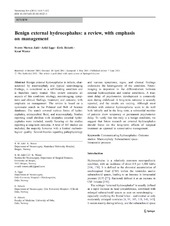Benign external hydrocephalus: a review, with emphasis on management
Peer reviewed, Journal article
Published version
Permanent lenke
https://hdl.handle.net/1956/5247Utgivelsesdato
2011-06-07Metadata
Vis full innførselSamlinger
Originalversjon
https://doi.org/10.1007/s10143-011-0327-4Sammendrag
Benign external hydrocephalus in infants, characterized by macrocephaly and typical neuroimaging findings, is considered as a self-limiting condition and is therefore rarely treated. This review concerns all aspects of this condition: etiology, neuroimaging, symptoms and clinical findings, treatment, and outcome, with emphasis on management. The review is based on a systematic search in the Pubmed and Web of Science databases. The search covered various forms of hydrocephalus, extracerebral fluid, and macrocephaly. Studies reporting small children with idiopathic external hydrocephalus were included, mostly focusing on the studies reporting a long-term outcome. A total of 147 studies are included, the majority however with a limited methodological quality. Several theories regarding pathophysiology and various symptoms, signs, and clinical findings underscore the heterogeneity of the condition. Neuroimaging is important in the differentiation between external hydrocephalus and similar conditions. A transient delay of psychomotor development is commonly seen during childhood. A long-term outcome is scarcely reported, and the results are varying. Although most children with external hydrocephalus seem to do well both initially and in the long term, a substantial number of patients show temporary or permanent psychomotor delay. To verify that this truly is a benign condition, we suggest that future research on external hydrocephalus should focus on the long-term effects of surgical treatment as opposed to conservative management.

